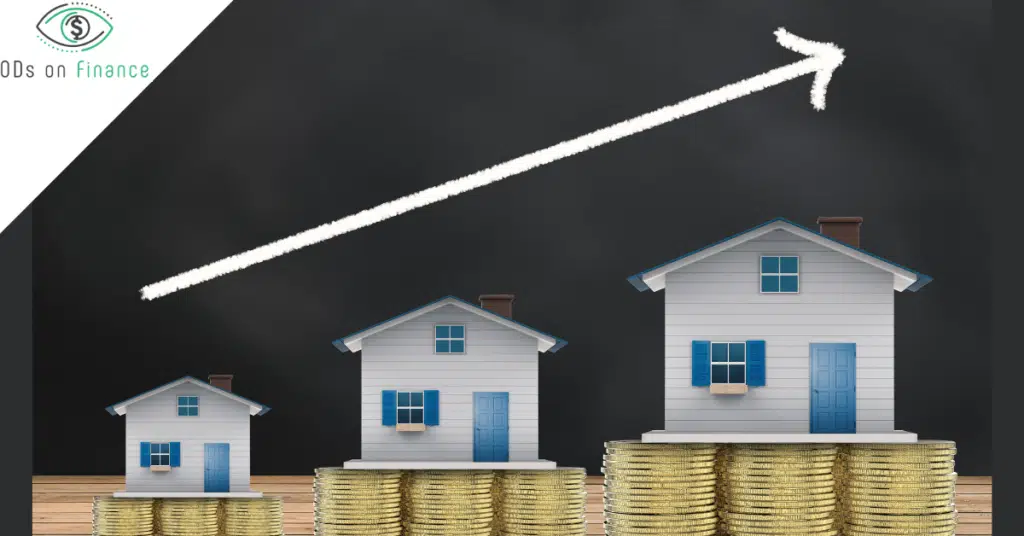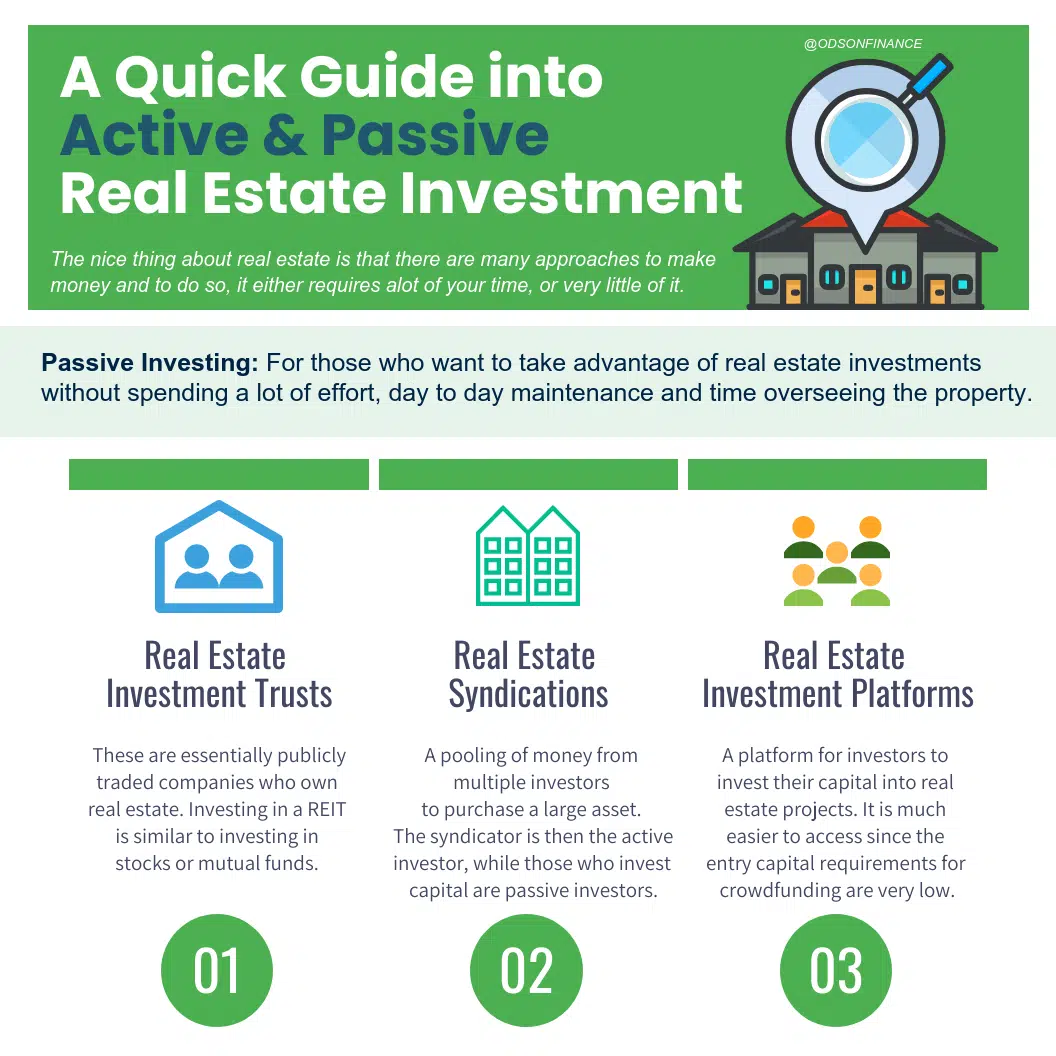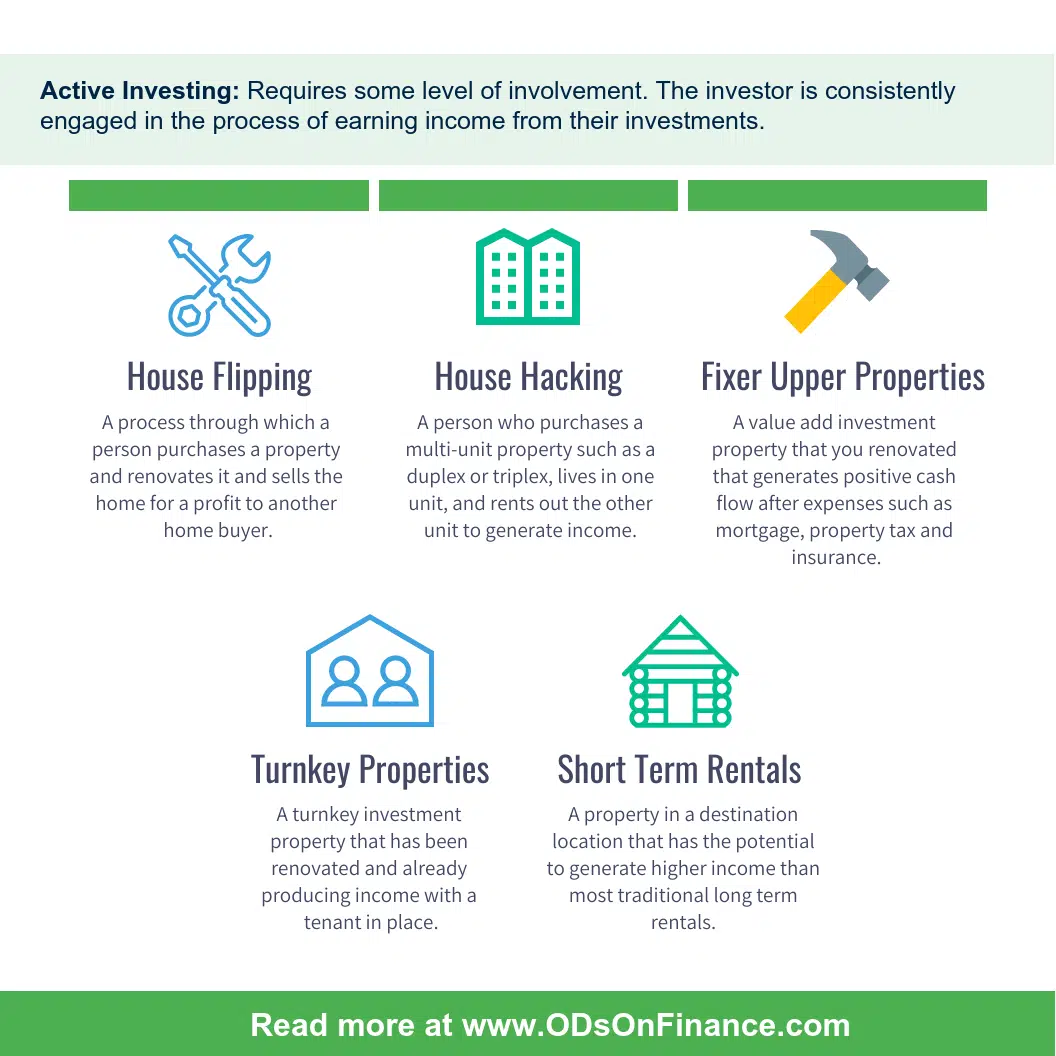The OD’s Quick Guide into Active & Passive Real Estate Investment

You’ve heard it again and again that real estate is an excellent pathway to accumulate significant wealth. However, you should also know that most real estate investors do not get rich overnight, as it can take years for investment properties to accumulate enough equity and generate significant wealth.
I experienced this first hand with my real estate investment properties. I purchased my first rental property about 5 years ago at the end of 2017 with a single family home. Today, 5 years later, it has doubled in value and my cash flow has nicely doubled as well. You too can begin your journey of real estate investing with a single investment property the same way I built my portfolio - focusing on purchasing value-add rental properties, rehabbing them and then renting them out; or you can simply be completely hands off and be a passive investor in large multi family apartment complexes.
The nice thing about real estate is that there are many approaches to make money and to do so either requires a lot of your time, or very little of it. Simply put, real estate investing can typically be classified as either active or passive investing. Let’s take a look at these categories to learn which may be the best fit for you!
Active Investing
Active investing in real estate essentially means that the investor is consistently engaged in the process of earning income from their investments. The level of activity may vary as many investors choose to hire a property manager for day-to-day concerns, leaving them focused on the bigger picture, such as acquiring more properties, seeking new investors and/or securing financing. Notably, active investing definitely requires some level of involvement. Let’s take a look at some active real estate investing examples below.
(1) House Flipping
House flipping is perhaps the most commonly understood category in this active investing for many people. After all, flipping houses became very popular in the 2000’s due to the ability for people – particularly those with some DIY skills – to earn significant profits with some sweat equity!
House flipping is a process through which a person purchases a property and renovates it. After renovations are complete, they ideally sell the home for a profit to another home buyer. Some people purchase homes that need a lot of work for a very low price while others may simply purchase quality homes and make a few small upgrades such as kitchen or bathroom changes. The goal is that renovations add to the property’s value.
However, house flipping is not a sure bet for success. There are common concerns that may eat into profits or even contribute to a loss. The most common is going over budget during the renovation phase. This can be quite common particularly if unknown problems are discovered. Permitting, labor and supply shortages are common issues during renovations that may not have been anticipated. Additionally, these delays to completing a project or selling the flipped house can lead to increased financing costs, which can really start eating at your profits even further.
Financial Pearl
"While house-flipping might look exciting on TV, a lot of newer investors are not aware of the risks such taking a 10-12% hard money loan required to fund the purchase, renovation delay which can increase holding time, risk of down market (like 2022), getting taxed on the profit gains at ordinary income (35-40% for a typical OD tax bracket), and lastly time it takes to manage the project, often making it a 2nd full time job! So proceed carefully!"
(2) House Hacking
House hacking is a term you probably are not familiar with. This refers to a person who purchases a multi-unit property such as a duplex or triplex, lives in one unit, and rents out the other unit. This can be an excellent way to generate extra income.
One of the big benefits of house hacking is that you are able to utilize FHA loans, providing the ability to purchase with only a little bit of money as a down payment. This is why first time home buyers may be a good fit for house hacking. In a strong rental market, rent from the other units can completely eliminate your monthly mortgage, thus allowing you to live “rent free” and even better yet, enjoy a little bonus passive income.
Simply put, house hacking is a great way to get your foot into the door of real estate investment with as little as 3.5% down through an FHA loan.
Financial Pearl
"For the newer OD investor, house-hacking is a great way to get started on getting your first property! Remember that while house-hacking might not produce the best cash flow, the important thing is that it save you on the rent that you would normally pay to a landlord, while building up equity in the house! Remember this a business so treat like one!
Definitely consider doing it while you are young & single because your future significant other might NOT appreciate sharing a space with 2-3 dirty dudes playing beer pong all night! "
(3) Rental Property
Many investors choose to purchase an investment property, renovate it and rent it out to generate positive cash flow after expenses such as mortgage, property tax and insurance are accounted for. Rental properties are great ways to generate income, and the money you earn will quickly accumulate if you own a number of properties. More importantly, if you purchase the investment property, under valued, and renovate it to increase its value, you are also building equity and wealth.
Most people will own a few rental properties that they manage themselves. However, overseeing properties can take up much of your time, leading many people to delegate most of the day to day tasks to a property management company. Owning rental properties requires a great deal of attention, as you want to not only ensure that the property is in good condition but also need to consider the long-term rental trends in a particular area.
Investing in rentals in areas near universities, growing areas, and cities that are seeing job growth is a good strategy as they will attract a better tenant pool and have high rental demand.
Financial Pearl
"By far long term buy & hold rental property are the safest and most tax-efficient form of "active" RE investing since many investors use a low-cost fixed 30-years conventional loan to fund the purchase. In addition, investors avoid all the risk of a down market like 2008-2009 because many will hold it for 20+ years, thus building equity through debt pay down, yearly rent increase and tax depreciation!
Our favorite method for long-term rentals is the BRRR (Buy, Rehab, Refinance, Repeat). "
(4) Turnkey Rentals
Many people may want to invest in real estate but are turned off by the thought of overseeing significant renovations. If you are one of those, turnkey rentals may be a good fit for you. Turnkey is a phrase that refers to the fact that your property is “rent ready” when you purchase it and may possibly already have a tenant in place paying rent. Typically, these are purchased from other companies who have already done renovations for you and you are paying a premium to take over the property with a tenant already in place, thus already producing income. Hence, the term, “turnkey” - you are making income the day you close on that property!
While this may sound like an ideal solution for hands off real estate investors, it also comes with some risks and is not completely passive. First, as mentioned early, you are likely going to pay top dollar for the property. If you purchase a turnkey rental in a declining market, your investment may potentially lose value. Additionally, even if the market grows, it may take longer to gain equity as you won’t be seeing returns since you’ve purchased at a premium.
More importantly, tenant placement is crucial to your success as a real estate investor. If you are purchasing a turnkey property with a tenant already in place, you run the risk of the tenant not being properly vetted. Keep in mind that some turnkey companies may just place any tenant, so they can sell the property to you as an income producing property. Your luck may run out if that tenant decides not to pay a few months into your purchase.
Essentially, with turnkey rentals, the key is to make sure the renovations done by the turnkey company are of quality work, you are not substantially overpaying for the property and to ensure that the tenants continue to pay rent and keep the property in good condition.
(5) Short Term Rentals
Short term rentals are perhaps the newest trend in rental properties in the past few years, especially after the pandemic when travel restrictions were lifted. The appeal for short term rentals in the right location lies in its ability to produce much more income than a traditional long term rental. Airbnb’s and VRBO’s are both popular platforms for listing short term rentals.
Typically, short term rentals cater to travelers who stay in the property for a few nights or perhaps a bit longer. The key with short term rentals is to purchase them in areas that are in high demand. Seasonal areas such as beaches or ski areas are often good choices even though they may be unused during part of the year. Additionally, downtown areas close to shopping centers, concert halls and college towns can be lucrative. The key here is to adequately gauge the desirability of a location and to have proper reserves in place when the occupancy is low.
Short term rentals require more extensive management. They also carry some significant risk. For example, during the height of COVID-19, travel almost completely ceased, meaning those who relied on short term rentals for income saw almost no occupancy and risked financial struggles as a result.
Financial Pearl
"Short term rental will usually have the largest cash flow but they do require significantly MORE work/management. In addition, many local laws are getting more strict with STR houses due to complaints from residents, so your area might be completely banned in the future! So know your local area & their views toward STR well prior to purchasing a property!"
Passive Investing
For those who want to take advantage of real estate investment without spending a lot of effort, day to day maintenance and time overseeing the property - passive investing may be a better pathway for you. There are a number of options when it comes to passive real estate investing including the following:
(1) Real Estate Investment Trusts (REITs)
REITs are a good way to passively invest in real estate. These are essentially publicly traded companies who own real estate. Investing in a REIT is similar to investing in stocks or mutual funds.
A big benefit of this route is your assets are relatively liquid as you can easily buy and sell them. Additionally, there are REITs aimed at almost every conceivable type of real estate from residential to commercial and industrial. The drawback is that your returns won’t be as extensive as being an active investor; however, the passive income is still better than your money sitting in your bank account.
Financial Pearl
"If you have a stock brokerage, REITs are a good way to passively invest in real estate. These are essentially publicly traded companies who own real estate. One of my favorite fund is The Vanguard REIT Index Fund (VGSIX) which is an index that tracks domestic equity real estate investment. Easy and easy way to capture the whole RE market for any investor wanting more exposure aside from stocks"
(2) Real Estate Syndications
Real estate syndications differ from REITs in that they are not publicly traded. Instead, a syndicator or sponsor will pool together capital from several investors which is then used to invest in larger scale properties. The syndicator is then the active investor, managing the day to day operations while those who invest capital are passive investors. An example would be a syndication for a large 200 unit apartment complex.
While the investment may be too large of a feat for one single individual, a group of investors will pool money together, through a syndication, to buy the 200 unit apartment. These investors are passive in nature and they are awarded profit distributions over the course of the syndication period, usually between 3-10 years, and then returned a large sum of profit once the asset is sold.
Keep in mind that returns and hold times may vary considerably between different real estate syndications (usually 5 years). Thus, it is important to do your research before investing. Additionally, many syndications require investors to be SEC accredited, which is not necessarily attainable for many people, particularly new investors.
Want to learn more about how you can be a passive investor in large apartment complexes? You can register here with New Sight Capital, a vetted partner of ODs On Finance!
(3) Real Estate Investment Platforms
Real estate investment platforms are good choices for people who want to invest in a small portion of a major real estate project. Think of this somewhat as crowdfunded real estate projects. There are a variety of places to access these projects such as CrowdStreet and FundRise.
The benefits of this type of passive investment are that it is much easier to access than real estate syndications since the entry capital requirements for crowdfunding are very low and range depending on the platform from $50 to $1,000 or so. However, there are still strong risks in investing in projects in this manner and due diligence is certainly an important requirement for success.
Final Thoughts
As you can see, there are a wide variety of options when it comes to investing in real estate. For those wanting to be more active in their investments, you have many options from house flipping and hacking, to various options for rentals. For those wanting passive income, there are three major types of investments.
Each of these options has their benefits as well as drawbacks, and all require extensive research and due diligence. Ultimately, you’re more likely to have stronger returns on your investment with active investing although it will come with the requirement of being more involved. Above all, do your research in determining what option is best for you, your risk tolerance and sanity! Happy investing!
Want to get the best mortgage rate and access to doctor's loan? Check out Recommended Doctor's Mortgages
Want to get daily real estate tips and Julie's RE journey? Follow Julie's journey at IG @House_Hustle



Facebook Comments